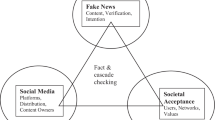Abstract
I investigate whether attempts by the media to determine a candidate's fitness for office lowers the average quality of public officials, what I call the media scrutiny paradox. Media scrutiny imperfectly signals heterogeneous candidates' type, but imposes privacy costs and reputational costs on politicians. The quality of office holders falls if the selection effect is adverse and outweighs the screening effect. A low quality information signal, which could result if the media focus on irrelevant aspects of behavior, makes the screening effect small and the media paradox more likely to hold. Individuals of good character might invest more in their reputation and have more at stake from being (falsely) identified as a rapscallion. The actual malice standard established in New York Times v. Sullivan likely increased (relatively) the cost of candidacy for good people and lowered the quality of officials.
Similar content being viewed by others
References
Alesina, A., & Cukierman, A. (1990). The politics of ambiguity. Quarterly Journal of Economics, 105(4), 829–850.
Altschull, J.H. (1995). Agents of Power, 2nd edition. White Plains NY: Longman.
Anderson, W.L. (1999). Facts, Fiction, and the Fourth Estate. Ph.D. Dissertation, Auburn University.
Anderson, W.L. (2002). The Washington Post and ‘Jimmy's World.’ American Journal of Economics and Sociology, forthcoming.
Barber, J.D. (1992). The Presidential Character. Edgewood Cliffs NJ: Prentice Hall.
Barro, R.J. (1973). The Control of Politicians: An Economic Model. Public Choice, 14, 19–42.
Bennett, W.L. (1996). News: The Politics of Illusion, 3rd edition. White Plains NY: Longman.
Bezanson, R., Cranberg, G., & Soloski J. (1987). Libel Law and the Press. New York: Free Press.
Brennan, G., & Hamlin, A. (1995). Economizing on virtue. Constitutional Political Economy, 6(1), 35–56.
Cass, R.A. (1989). Principle and interest in libel law after New York Times: An Incentive Analysis. In The Cost of Libel, edited by E.E. Dennis and E.M. Noam, pp. 69–120. New York: Columbia University Press.
Coate, S., & Morris, S. (1995). On the form of transfers to special interests. Journal of Political Economy, 103(6), 1210–1235.
Cowen, T. (2000). What Price Fame? Cambridge: Harvard University Press.
Crain, W.M., & Goff, B.L. (1986). Televising legislatures: An economic analysis. Journal of Law and Economics, 29, 405–421.
Dixit, A., Grossman, G.M., & Helpman, E. (1997). Common Agency and Coordination: General Theory and Application to Government Policy Making. Journal of Political Economy, 105(4), 752–769.
Downs, A. (1957). An Economic Theory of Democracy. New York: Harper and Row.
Epstein, R.A. (1989). Was New York Times v. Sullivan Wrong? In The Cost of Libel, edited by E.E. Dennis and E.M. Noam, pp. 121–155. New York: Columbia University Press.
Fallows, J. (1996). Breaking the News. New York: Pantheon Books.
Ferejohn, J. (1986). Incumbent Performance and Electoral Control. Public Choice, 50, 5–25.
Garoupa, N. (1999). Dishonesty and Libel Law: The Economics of the ‘Chilling' Effect. Journal of Institutional and Theoretical Economics, 155(2), 284–300.
Glazer, A., & Hassin, R. (1998). The Calculus of Stonewalling. Paper presented at 1998 Public Choice Society meetings.
Hamilton, J.T. (2004). All the News That's Fit to Sell. Princeton: Princeton University Press.
Judis, J.B. (1987). The Hart Affair. Columbia Journalism Review, July/August, pp. 21–25.
McChesney, F.S. (1987). Sensationalism, Newspaper Profits, and the Marginal Value of Watergate. Economic Inquiry, 25, 135–144.
Mullainathan, S., & Andrei S (2002). Media Bias. NBER Working Paper 9295.
New York Times v. Sullivan. (1964). 376 U. S. 254, 84 S. Ct. 710.
Noam, E.M. (1987). A Public and Private Choice Model of Broadcasting. Public Choice, 55, 163–187.
Osborne, E. (1998). How to Screen Political Candidates. Unpublished manuscript, Department of Economics, Wright State University.
Parker, G.R. (2004). Self-Policing in Politics. Princeton: Princeton University Press.
Patterson, T.E. (1993). Out of Order. New York: Vintage.
Posner, R. (1999). An Affair of State. Cambridge: Harvard University Press.
Sabato, L.J. (1993). Feeding Frenzy. New York: Free Press.
Sabato, L.J., & Lichter S.R. (1994). When Should the Watchdogs Bark? Washington: Center for Media and Public Affairs.
Sanford, B.W. (1999). Don't Shoot the Messenger. Lanham MD: Rowman & Littlefield.
Seib, P. (1994). Campaigns and Conscience. Westport CT: Praeger.
Smith, T.J., & Lichter R.S. (1997). What the People Want from the Press. Washington: Center for Media and Public Affairs.
Sutter, D. (1998). Leviathan at Bay? Constitutional Versus Political Controls on Government. Economic Inquiry. 36(4), 670–678.
Wilson, R.A. (ed.) (1995). Character Above All. New York: Touchstone Books.
Author information
Authors and Affiliations
Corresponding author
Rights and permissions
About this article
Cite this article
Sutter, D. Media scrutiny and the quality of public officials. Public Choice 129, 25–40 (2006). https://doi.org/10.1007/s11127-006-9025-0
Received:
Accepted:
Published:
Issue Date:
DOI: https://doi.org/10.1007/s11127-006-9025-0




